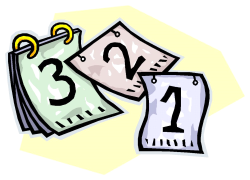
All News
PLAY and DEFENCE for Improving Players

Counting ... Down
That’s the idea if you are defending. “That”? Why, to beat the contract! Playing Pairs, there are times when you want to restrict overtricks but generally, your score will look much better if you have beaten their contract.
So, you are defending 3NT after what seems a gambling type of auction:
Dealer East. E/W Vul.
West North East South
Pass 1NT (12-14)
Pass 3![]() Pass 3NT
Pass 3NT
All Pass
3![]() was invitational, around a 9-11 count with a six card suit. South decided to give 3NT a go. On some days, you might have overcalled 2
was invitational, around a 9-11 count with a six card suit. South decided to give 3NT a go. On some days, you might have overcalled 2![]() , showing spades and a minor. However, the bid was a little risky as partner was a passed hand and outside your suit, your own hand was uninspiring:
, showing spades and a minor. However, the bid was a little risky as partner was a passed hand and outside your suit, your own hand was uninspiring:
![]() AKJ87
AKJ87
![]() Q63
Q63
![]() J632
J632
![]() 7
7
Your first decision is your choice of lead. There really is only one suit as your clubs are so weak and hearts highly speculative. Yet, which spade? On some days, a low spade might work, especially when your partner has Q doubleton and declarer 4 headed by the 10 but on balance, it seems best not to lose the lead at trick one. Lead a high spade.
In such cases where you hold AK, quite a popular approach is to lead the ace if you want your partner to give attitude (say whether they like or dislike the suit) or the king if you want your partner to tell you how many cards they have in the suit (count). In no-trumps, the king lead can first ask partner to jettison any honour held (AKQJ) so that you know if they do not throw one, they have not got one. Of course, your own suit must be good enough to withstand the throw of such an honour.
AKJ87 is normally good enough.
It is up to you if you play “natural count” (high low with an even number of cards) or “reverse count” (low high with an even number).
So, let’s say you lead the king. Dummy’s spade holding is 92. Playing natural count, partner plays the 3, showing an odd number which cannot be five as declarer has to hold at least two to open 1NT. We have to hope that the 3 is not a singleton. Playing reverse count, partner plays ![]() 6. Declarer follows with
6. Declarer follows with ![]() 5.
5.
Both methods tell us South holds the queen as partner did not throw that card. It looks from the fall of the ![]() 5 that
5 that ![]() 6 is from a 3 card suit. The
6 is from a 3 card suit. The ![]() 3 using natural count sends the same message. So, declarer holds
3 using natural count sends the same message. So, declarer holds ![]() Q?5.
Q?5.
We have to switch at trick two. Fortunately, this time, you will survive either a heart or diamond switch..but if you continue with a second spade, you will be writing down -400.
Come on, now, they are getting impatient waiting for you to play to trick two! What do you play?
| East Deals E-W Vul |
|
||||||||||||||||||||||||||||||
|
|
|
|||||||||||||||||||||||||||||
|
|||||||||||||||||||||||||||||||
| 3 NT by South |
If you choose to switch to a diamond, you would soon be writing down +100. Diamond to the ace will be followed by four more rounds of spades. If you choose a heart, it is unlikely that South would run the club suit (yes, North had 7 of them!) as declarer would be stuck for safe discards. So they would win the ![]() K with the ace and play the
K with the ace and play the ![]() T. Don’t be fooled. You know where the jack is! Up with your queen and try a low diamond now or else you will not be recording a plus.
T. Don’t be fooled. You know where the jack is! Up with your queen and try a low diamond now or else you will not be recording a plus.
What is evident is that “count” whichever form you play was really helpful in knowing the best way to beat the contract. It often is. Count is a good method of communication in certain situations. Some play it all or most of the time. When declarer threatens to run a long suit, it is important the defence communicate correctly with any form of count proving very useful in providing the information required. It is not the only way but it is a good way.
So “count” and get them “down”!
Richard Solomon
Go Back View All News Items
